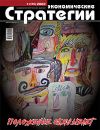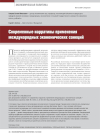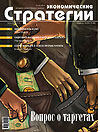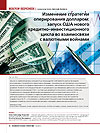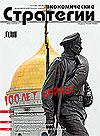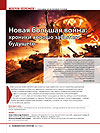Contemporary Narratives for Applying International Economic Sanctions
DOI: https://doi.org/10.33917/es-5.185.2022.22-29
Recently the role of sanction restrictions has sharply increased in the practice of regulating economic relations between countries,
meanwhile their application is determined by many factors. At the same time, in the context of intensifying geopolitical competition and growing volatility of the global economy, the dynamics of sanctions application raises more and more questions. On the one hand, economic sanctions are an instrument of coercion for target countries, and on the other hand they make international exchange and cross-border mobility of the factor more and more vulnerable. Heterogeneous nature of the economic sanctions’ impact on sending and target countries does not allow us to say that sanctions are an unambiguous instrument of an effective trade policy.
This article analyzes the key narratives of economic sanctions regimes in all their diversity at the present stage, new forms and
mechanisms of sanctions, as well as their consequences for various aspects of life of the world community.
References:
1. Spiegelberger W.R. Anatomy of a Muddle: U.S. Sanctions against Rusal and Oleg Deripaska. Russia Political Economy Project, Foreign Policy Research Institute, 2019, April 29, available at: https://www.fpri.org/article/2019/04/anatomy-of-a-muddle-u-s-sanctions-against-rusal-and-oleg-deripaska/
2. Sanger D.E., Benner K., Goldstein V. Huawei and Top Executive Face Criminal Charges in the U.S. New York Times, 2019, January 28, available at: https://www.nytimes.com/2019/01/28/us/politics/meng-wanzhou-huawei-iran.html.
3. Hufbauer G.C., Jung E. What’s new in economic sanctions? European Economic Review, 2020, vol. 130, iss. C, pp. 103572.
4. Bapat N.A., Heinrich T., Kobayashi Y., Morgan T.C. Determinants of Sanctions Effectiveness: Sensitivity Analysis Using New Data. International Interactions, 2013, vol. 39 (1), pp. 9–98.
5. Early B.R., Spice R. Economic Sanctions, International Institutions, and Sanctions Busters: When Does Institutionalized Cooperation Help Sanctioning Efforts? Foreign Policy Analysis, 201, vol. 11 (3), pp. 339–360.
6. Peksen D. Autocracies and Economic Sanctions: The Divergent Impact of Authoritarian Regime Type on Sanctions Success. Defence and Peace Economics, 2017, vol. 30 (3), pp. 253–268.
7. Connolly G.E. Economic Sanctions. Agencies Assess Impacts on Targets, and Studies Suggest Several Factors Contribute to Sanctions’ Effectiveness. Report to Congressional Requesters, GAO-20-145, United States Government Accountability Office (GAO), 2019, October, p. 19.
8. Krustev V.L., Morgan T.C. Ending Economic Coercion: Domestic Politics and International Bargaining. Conflict Management and Peace Science, 2011, vol. 28 (4), pp. 351–376.
9. Nooruddin I., Payton A.L. Dynamics of Influence in International Politics: The ICC, BIAs, and Economic Sanctions. Journal of Peace Research, 2010, vol. 47 (6), pp. 711–721.
10. Golliard M.M. Economic Sanctions: Embargo on Stage. Theory and Empirical Evidence. Fribourg, University of Tampere, 2013, January, pp. 107, 108.


